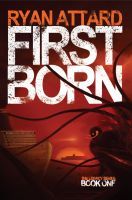 Author, Ryan Attard, sent me an ARC of First Born for review.
Author, Ryan Attard, sent me an ARC of First Born for review.
Description from Goodreads:
Meet Erik Ashendale, wizard. He solves all kinds of problems of a magical and freaky nature. Especially when it comes to hunting down the supernatural. So when he and his talking cat are asked to protect a girl who’s being chased by a big-time demon, they can hardly refuse, especially when the rent’s due.
Once the fight takes shape, Erik and the rest of his unlikely companions have to pit themselves against the elemental forces of good and evil: angels, demons, a Japanese monster, 1/7 of the Deadly Sins, talking pets . . . and even a morally ambiguous twin sister gets thrown into the mix. In order to stay alive, Erik must deal with his terrible past and the secrets of his family. And he must never forget the most important rule of his twisted world: Nothing is ever what it seems.
Review:
I was caught off guard by the beginning of First Born. It is told in past tense first person and recounts quite a lot of action right off the bat. It honestly felt a little bit like someone’s role-playing narration. There was just too much and this led to a bit of a WTF moment. But as I read on the voice became really distinctive. It reminded me a lot of the Guy Noir segments of A Prairie Home Companion on NPR. Do you know those?
In the skits Guy Noir is a private detective who recounts the events of his cases, some of them quite eyebrow raising, in an often placid tone. I sensed that here too. Erik blithely relates feats of his own death defying skill, strength and bravery as if they are little more than humdrum. It led to bit of a Lake Wobegone Effect. (This is the impression that everything about a person or place is superior to the average, even if it isn’t really.)
It all seemed a little unreal, and not just because it was magic and all. It felt like that kid we all knew in high school. The one who exaggerated everything. If he saw the lead cheerleader adjusting her pantyhose he would brag to his friends that he saw her naked. He knew that his friends knew that he was full of shit, but he also knew that they would let him get away with it because they were in on the joke, him.
Here is an example from page 22.
“Hey, ugly,” I said. My voice was calm but every word oozed ethereal power as if I were possessed by the spirit of an arcane deity.
Taken on its own this just feels horridly over written. I mean who says this about themselves? Such descriptions are generally reserved for third person narrators because they can avoid sounding too smug. This leave Erik feeling like a puffed up egoist. That’s before we even consider that in the midst of a life and death battle the character was unlikely to really have been paying attention to the tone of his own voice in order to know what it sounded like and make the future comparison. This only further undermines the credibility of the statement.
But as I read the book more as a magical noir narrative like Guy Noir’s, with the genre’s known tendency to exaggerate events and flounce language, it put the narrative in context and made me laugh. I could see the humour in it, and there is plenty of humour. If you read the above passage with the assumption that the character might be purposely over-exaggerating it takes on a whole new feel. Suddenly you have to wonder if some of the effect isn’t intended to divert the reader from looking too closely at him as a person by distracting you with superfluous language. Which is something only a first person narrator, aware of himself, the grçavity of his actions, and the light it might paint him in would seek to do.
As the book progressed Erik also had a self-deprecating habit, such as referring to himself as the ‘only wizard stupid enough to…” or readily referring to himself as brawn and not brains. This went a long way toward humanising him and countering the praise me I just saved the world effect that the first person narrations of heroic events created. It also helped that as the plot established itself the lengthy and largely unintended descriptions of his own awesomeness became less frequent.
The story is really interesting and after the first couple of chapters Erik and his familiar are really likeable characters. They are witty and sarcastic, often throwing scathing one-liners at each other to dissipate tension. There are any number of laugh out loud moments. Erik is also dedicated to helping those unable to help themselves. You have to appreciate that.
I suspect that there are going to be a lot of books in this series, probably seven if I had my guess. So there is plenty of time for the plot to progress and characters to carve their own niche. This one took a couple of chapters to settle, but rolled along nicely after that.
I’ve read that there will likely be 13 book in this series, as opposed to 7 as I guessed.